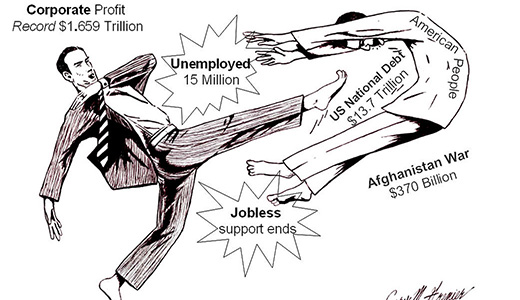
Yesterday Joseph Stiglitz, Nobel prize-winning economist, led a panel explaining a progressive alternative to the Simpson-Bowles deficit reduction plan.
The Simpson-Bowles plan is the baby of the center-right forces leading the president’s deficit reduction commission.
Wednesday’s panel was organized by the Citizens’ Commission on Jobs, Deficits And America’s Future. It is a coalition of Demos, the Center for Economic Policy and Research, and the Economic Policy Institute. In addition to Stiglitz, the panel also included economists Dean Baker from CEPR and John Irons from EPI, along with Robert Kuttner from American Prospect magazine, and Nancy Altman, an expert on pension rights and Social Security.
Professor Stiglitz opened with an anecdote about recent pressure on Spain to adopt Greek and Irish style austerity measures to ward off the “bond vigilantes” – bankers and investors who allegedly will ruin your economy and country if you don’t bail out bankers with cuts in workers’ pay and benefits. If you don’t do these things, the threat is, central banks will not lend you any more money.
Stiglitz said: “So Spain DID adopt new austerity policies. But bond interest rates went up anyway! Why? Not because the bankers did not believe Spain was serious. They DID believe them – and THEY KNOW that the plan will NOT work! Ireland, which six months ago adopted the most rigorous cutbacks in government services, and now is in crisis again, is the proof.”
The Citizens’ Commission keeps the focus of recovery on jobs and investment – without which, no plan can solve the deficits.
It rejects the attacks on Social Security in Simpson-Bowles since Social Security has absolutely nothing to do with the current deficit issues. (Here’s my proposal to Erskine Bowles – blue dog with a millionaire’s pension cushion – if you agree to live on your proposed Social Security reform, so will I. Until then, please just stay retired.)
It rejects regressive taxation (more cuts for the rich) – another awful part of the Simpson-Bowles proposal. It focuses on raising revenues and incentives that will stimulate the most strategic structural changes – green energy and infrastructure – through things like taxes on emissions and gasoline, and congestion fees.
The Citizens’ Committee report says: “The United States continues to suffer the aftereffects of the worst economic recession since the Great Depression, triggered by a financial crisis whose causes were ignored or made worse by elite policymakers for decades. Today, more than 25 million Americans who are ready and willing can’t find full-time work. Personal wealth has declined sharply, creating an especially uncertain future for people approaching retirement age. Confidence is down for both consumers and businesses, which prevents sustained economic growth.”
Only 10 years ago, at the end of the Clinton administration, there were record surpluses. Now we face record deficits that are spreading alarm and confusion across the land. Further, the report notes, this “constrained depression” comes after a decade that has “featured the worst job creation in the post-war period, declining wages for most Americans, weaker unions confronted by employer attacks on rights to organize, continued decay of basic infrastructure, an ongoing crisis in public education, record trade deficits and job loss abroad, and extreme inequality.”
Despite the ongoing pain, the debate in Washington is now dominated by conservative cries for immediate reduction of the federal deficit, no unemployment benefit extensions, tax cuts for the rich, no rights for unions, calls to cut the minimum wage, and “trickle-down” theories about jobs dribbling down from the well fed and wealthy. “The hungry dog huts harder,” these folks say to the five applicants for every job opening.
Several elite “commissions” – two privately financed and one created by the president and Congress – have effectively shifted the attention of the media to deficits as the primary focus for public action.
One voice has been conspicuously absent from most discussion of deficits – that of the American people. Polls have shown that the public’s opinion and the opinions of many leading economists are surprisingly well aligned. The public agrees with economists who warn that deficit reduction must be performed judiciously, without restricting government’s ability to create jobs and without damaging needed social programs.
With this new effort by the Citizens’ Commission, there is a positive handle that movements can grasp to move this debate away from the fates of Greece, and Ireland. What we really have here is a national – even international – strike by capitalists who, against all wisdom and even their own best long-term interests, have simply decided that NO circumstances of national or moral need warrant expanding the public sector further into the domain of private capital. So they are refusing to invest, and are spending billions on political lobbying of every description – including sponsoring fringe racist and fascist type hysteria – to nullify the will of the American people.
They seem to think we are dogs. Well, if so, then maybe it’s time to form some packs and go after the masters.
Image: “Republican government: block all bills … demand more wealthy tax cuts.” Cory M. Grenier CC 2.0

MOST POPULAR TODAY

High Court essentially bans demonstrations, freedom of assembly in Deep South

UN warns that Israel is still blocking humanitarian aid to Gaza

U.S. imperialism’s ‘ironclad’ support for Israel increases fascist danger at home


Resource wars rage in eastern Congo, but U.S. capitalism only sees investment opportunity






Comments